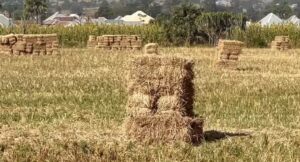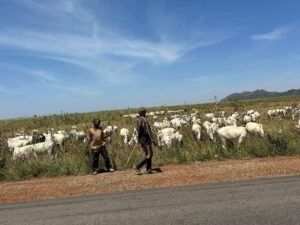
During my PhD days when I stayed in Shika, just opposite the National Animal Production Research Institute (NAPRI), in 1990-92, the scenery I enjoyed best was that of bales of Bracharia hay that lay on the pastures beside the Zaria-Funtua highway every year around this time. I never thought that it would be an annual scene in my backyard two decades later.
The pasture is over 60 years old. While the cows graze among the paddocks during the first half of the raining season, they are weaned off the grass to allow for significant harvest of hay during the dry season.
Attempts to replicate ranching by state governments and private organisations in many places failed and both NAPRI and NVRI, Vom, themselves, as not for profit organizations but research institutes, would not have survived without subvention from the Federal Government for salaries, machinery and inputs.
The task before the new Ministry of Livestock Development is enormous. In Africa, open grazing and efficient utilisation of farm residue by livestock have guaranteed a constant source of meat for millennia without spending a single dollar. Changing it with ranching and other forms of intensive husbandry as grazing space continues to dwindle is inevitable but a very ambitious and expensive idea.
It means investors succeeding where hundreds have failed. African Ranch Co. Ltd tried it 108 years ago when Lord Lugard, as an exception, allocated it 25 sq m of pasture land at Allagarno in the old Borno Province to Mr. Spring. The company gave up within four years in 1920. In between 1920 and 2024, over 230 ranches developed by individuals and various governments, including Awolowo and Sardauna, have failed and gone due to corruption and non-profitability.
In the only two places throughout Africa (ask ChatGTP)—Benue and Ekiti States—where open grazing was outlawed in favour of ranching, not a single ranch has been developed in the past seven years. Had Nigeria toed that line, we may be left only with imported meat by now. Fortunately, the rest of the country was wiser. This tells you that ranching is not as cheap as we think it.
Ranching—the ultimate form of husbandry—not withstanding its formidable capital, requires substantial daily government subsidies per cow as in the European Union and shifting the cow itself from the possession of pastoralists and ordinary farmers in our villages to the hands of investors who have billions of Naira to inject.

In the hands of the investor and his exotic breed, meat would be available only in supermarkets. There would be no Fura for the ordinary folks. There would also be no oxen to manure the land of the farmer, plough it, weed it, transport his produce, fetch his water and give him profit when he sells the old bulls for younger ones. There would also be no cows for fattening. Grasses in our bushes and forests would, in many places, grow so tall and accumulate so much carbon on the ground as to burn down some villages and collapse some high tension towers in the event of fire.
The benefit is that we would have a country so serene without the eyesore of the open grazing cows. More importantly, there would be no pastoralists. They would all be upgraded to farmers who would enjoy the privileges of a settled Nigerian: a NIN-backed citizenship; a recognised, GPS compliant address; enjoying media coverage; basking in government protection, facilities and services in education, health, infrastructure and water; etc. Quiet would prevail in the post conflict Nigeria as we become unified by our joys of a crime-free society.
This is the thought that crosses my mind anytime I see cows grazing on the free African grass, or when I see villagers and townsmen alike invest in cows and jointly send them out for grazing outside their villages or when I see abundant meat everywhere with Lagos in particular consuming 4,000 cows daily, procured from nature without a Kobo of subsidy or a dollar for importation from overseas.
I welcome the new dawn that will transform Nigeria into Britain, Denmark or Switzerland in livestock production. I pray that our government will give the necessary land and subsidies—as it gives to NAPRI and NVRI and as the Europeans give to their farmers—and at the same time fill our pockets with the dollars we need to buy the expensive meat produced by the investors and acquire the machinery that would replace the cow on our farms.
Before the investors come to take over livestock production in the country, let our cows, for now, freely graze in nature and accord us cheap meat in every village, town and street across Nigeria. Let us make hay while the African sun shines.
* Dr. Aliyu U. Tilde, a farmer, politician and public affairs commentator, lives in Bauchi
